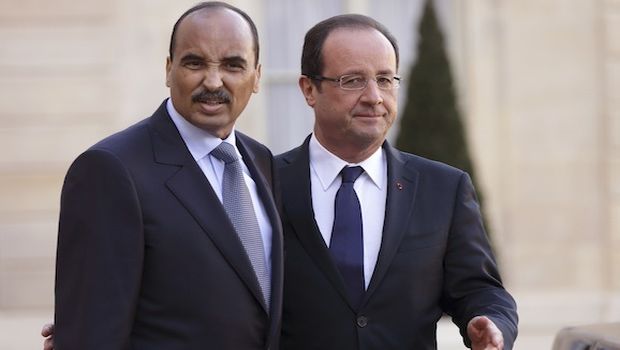
French President François Hollande (R) accompanies Mauritania’s president Mohamed Ould Abdel Aziz after a meeting at the Elysée Palace in Paris on November 20, 2012. (REUTERS/Philippe Wojazer)
This round of elections has been delayed since October 2011. Opposition figures say they will not participate in any elections until President Mohamed Ould Abdel Aziz steps down.
Ould Abdel Aziz was behind the 2008 coup that ousted former president Sidi Ould Cheikh Abdellahi and ruled the North African country in the months immediately following the coup, before being elected as civilian president in 2009.
With the gap between the government and the opposition now widening, French Ambassador to Nouakchott Hervé Besancenot has held a series of meetings with the country’s main opposition figures over the past few days. The first such meeting was with opposition leader and Rally of Democratic Forces (RFD) chief Ahmed Ould Daddah.
As the North African country’s former colonial ruler, observers of the political situation in Mauritania agree that Paris holds the keys to the political arena. France currently has a strong relationship with President Ould Abdel Aziz; however, it also maintains good relations with parties across the opposition spectrum, particularly with the Ould Daddah-led RFD.
Speaking on the condition of anonymity, an opposition source revealed to Asharq Al-Awsat that in the “heated” meeting with the French ambassador, Ould Daddah criticized the French stance towards what he described as the “political crisis gripping Mauritania.”
According to the source, Ould Daddah held Paris responsible for “not implementing the terms of the Dakar agreement” agreed in 2009 by the government of President Mohamed Ould Abdel Aziz and the opposition as a roadmap to democracy. The agreement was brokered by Paris, among other international participants.
The source told Asharq Al-Awsat that the French ambassador strongly defended his country’s position on the current crisis in Mauritania by insisting that “France does not interfere in the internal affairs of other countries.”
According to the source, Besancenot offered to mediate between the government and the opposition in an attempt to defuse the crisis and enable all opposition parties to take part in the legislative and municipal elections scheduled for November 23 to December 7 this year.
In contrast to his meeting with Ould Daddah, the ambassador’s meeting with senior opposition negotiator and head of the left-leaning opposition Union of the Forces of Progress (UFP) Mohamed Ould Maouloud was “friendly and positive,” Asharq Al-Awsat has learned.
Reportedly, Maouloud informed the ambassador that “in the absence of guarantees for transparent and honest elections, the opposition finds itself compelled to boycott them.”
“This in itself is dangerous, because the opposition will lose the parliament as a platform for conveying its political discourse and thus will only be left with the street, which will no doubt lead to turmoil in the country,” the source said of the meeting with the UFP head.
While waiting for the outcome of French efforts to establish a middle ground in the country, the Mauritanian government continues to adopt measures governing the forthcoming elections.
Most recently, it formed an electoral observatory that will include “credible and qualified figures with a broad experience,” according to Minister of Communication Mohamed Ould Hormah.
